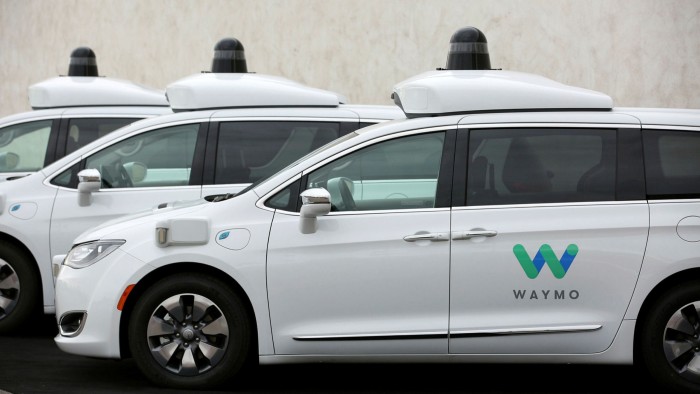Waymo raises further $2.5bn for self-driving car project

Roula Khalaf, Editor of the FT, selects her favourite stories in this weekly newsletter.
Waymo has raised an additional $2.5bn, as an array of investors continued to back its driverless car project, stoking concerns about the rate of cash burn at the Alphabet-owned company.
Waymo, which started as a Google project in 2009, is generally considered the industry leader and its unpiloted “robotaxi” service in Phoenix has no rival in the US.
But competition is increasing as its rivals consolidate. In the past year alone Uber’s driverless group merged with Aurora, Lyft’s “Level 5” unit was sold to a division of Toyota, and Cruise, the driverless unit of GM, acquired the start-up Voyage.
Waymo declined to comment on its valuation, which was reported to be north of $30bn last year. Cruise is also worth more than $30bn and last week received the first permit from California regulators to operate a driverless passenger service in the state.
The deployment of driverless technology is taking considerably longer than most of the industry expected a few years ago. The tremendous amounts of cash needed has also favoured Alphabet, which has $135bn of cash on hand.
Co-chief executives Dmitri Dolgov and Tekedra Mawakana said on Wednesday: “There’s no greater challenge in artificial intelligence than building and deploying fully autonomous technology at scale.”
Waymo said new funds would help to “continue advancing” what it called the “Waymo Driver”, an Android-like operating system that it seeks to deploy through partnerships including with Volvo Cars, Daimler Trucks and Stellantis.
Waymo raised $3.2bn from outside investors in early 2020. The company declined to disclose how quickly it was burning through cash but confirmed it had more than 2,000 staff. LinkedIn lists 2,407 employees.
A former Google employee estimated the costs of operation at about $1m per head, which suggested the new funding round would pay for just 12 months of activity. A rival executive suggested Waymo’s annual costs could be significantly less, but still above $1bn.
The fundraising follows at least eight high-level executive departures in recent months, including the chiefs of finance, manufacturing, safety, auto partnerships, future automotive and investor relations.
John Krafcik stepped down as chief after a five-year stint in April. Krafcik was an automotive production specialist who had led Hyundai’s North American operations and his departure was widely seen as Waymo acknowledging that the role he was to serve — deploying tens of thousands of driverless robotaxis in multiple cities — would take much longer than expected.
Alphabet led the funding round and Tiger Global participated for the first time. All existing investors took part including Andreessen Horowitz, T Rowe Price, the Canada Pension Plan Investment Board, Fidelity, Mubadala, Perry Creek Capital, Silver Lake, Temasek, plus auto supplier Magna and car retailer AutoNation.
Comments